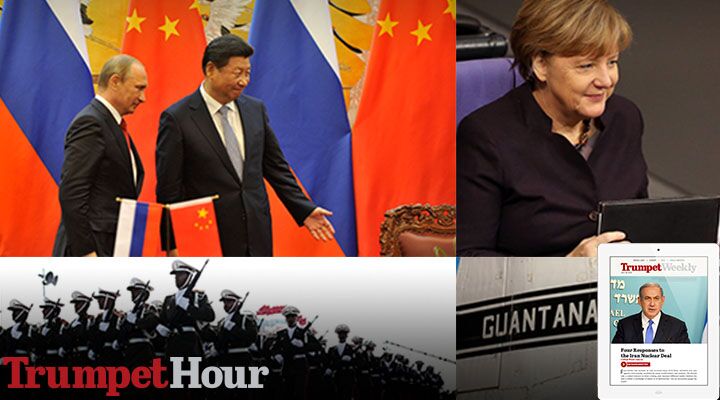Get all the important news from December 5-11 by downloading the Trumpet Weekly. Click here to receive it by e-mail every week.
Highlights:
Merkel: Time’s ‘Person of the Year’
“Merkel deserved to be named Time’s ‘Person of the Year’ because she has had the greatest impact on the world,” wrote George Friedman for Geopolitical Futures. “Her management of the European economic crisis has led Germany from being an utterly benign power to being an assertive and frightening one.”Friedman added: “All nations were aware of German ferocity. All of them saw Greece crumble in fear. … And the sheer ferocity of Merkel motivated others to pay up.”
Trumpet columnist Brad Macdonald commented on Germany in 2010: “[T]he country responsible for causing a multitude of conflicts in Europe, including the two most devastating wars in human history, is today—via its role as Europe’s economic savior—gaining dominion over the Continent. If you think that’s impressive, consider: Berlin is pulling off this accomplishment in spite of its ailing national leadership!”Iran’s retreat from Syrian war
The 2,000 Islamic Revolutionary Guard Corps members that were fighting in Syria by as late as October have now dwindled to only 700 personnel.
Bloomberg View wrote that this development follows the deaths and wounding of some of Iran’s leading military officers. Quds Force Cmdr. Qassem Suleimani could be one of those officers recently injured in Syria.
Trumpet managing editor Joel Hilliker discussed this development in his article “An Important Trend to Watch as Assad’s Rule Weakens in Syria.”Russia and China object to human rights meeting on North Korea
North Korea’s dictatorship deserves punishment: It operates an intricate network of political prisons and work camps, and it’s responsible for gross abuse, enslavement, systematic torture, forced starvation, rape and murder.Russia and China, however, are gearing up to use their United Nations Security Council veto power to prevent the United States from punishing North Korea for its human rights abuses.How does this development enhance global unity or security—the UN’s primary purpose for being?“One analyst recognized from the beginning that the UN would be, not just a failure at peacekeeping, but a catalyst to conflict,” wrote Trumpet writer Jeremiah Jacques in 2013. “‘Already I see the clouds of World War iii gathering at this conference,’ theologian Herbert W. Armstrong said at the organization’s inaugural meeting in 1945. ‘I do not see peace being germinated here, but the seeds of the next war!’”From Guantanamo to al Qaeda leadership in Yemen
Ex-Guantanamo detainee, Ibrahim Qosi, who pleaded guilty to charges of conspiracy and material support for terrorism in July 2010, is now a top leader of al Qaeda in the Arabian Peninsula (aqap).“While detained at Guantanamo in 2003, Qosi was asked why he stayed true to bin Laden for so many years,” wrote Thomas Joscelyn for the Long War Journal. “According to [Joint Task Force-Guantanamo], Qosi explained it was his ‘religious duty to defend Islam and fulfill the obligation of jihad, and that the war between America and al Qaeda is a war between Islam and aggression of the infidels.’ Qosi made it clear in aqap’s new [video] production that he hasn’t changed his opinion in the 12 years since.”Other news:
The Shanghai Cooperation Organization—a Eurasian group consisting of China, Russia, Kazakhstan, Kyrgyzstan, Tajikistan and Uzbekistan—met December 7 to discuss ways to strengthen military cooperation.“With the missile test violations under its belt and the U.S. uttering not a word in reply, Tehran is set to begin the period covered by the nuclear deal preparing to push the envelope on all of its restrictions,” wrote Commentary magazine, following the revelation that Iran test-fired a medium-range Ghadr-110 ballistic missile in November. “Their path to a bomb is assured by the fact that the deal expires, but Iran may not be satisfied with waiting for it to expire.”
Telegraph’s Ambrose Evans-Pritchard warned December 2 that China’s devaluation of the yuan is a bigger danger than the Fed’s imminent rate hikes.A major inquiry into the place of religion in modern British society concluded that Britain is no longer a Christian country—and that it should stop pretending as if it is.Get more details on these stories and more by subscribing to the Trumpet Weekly!

